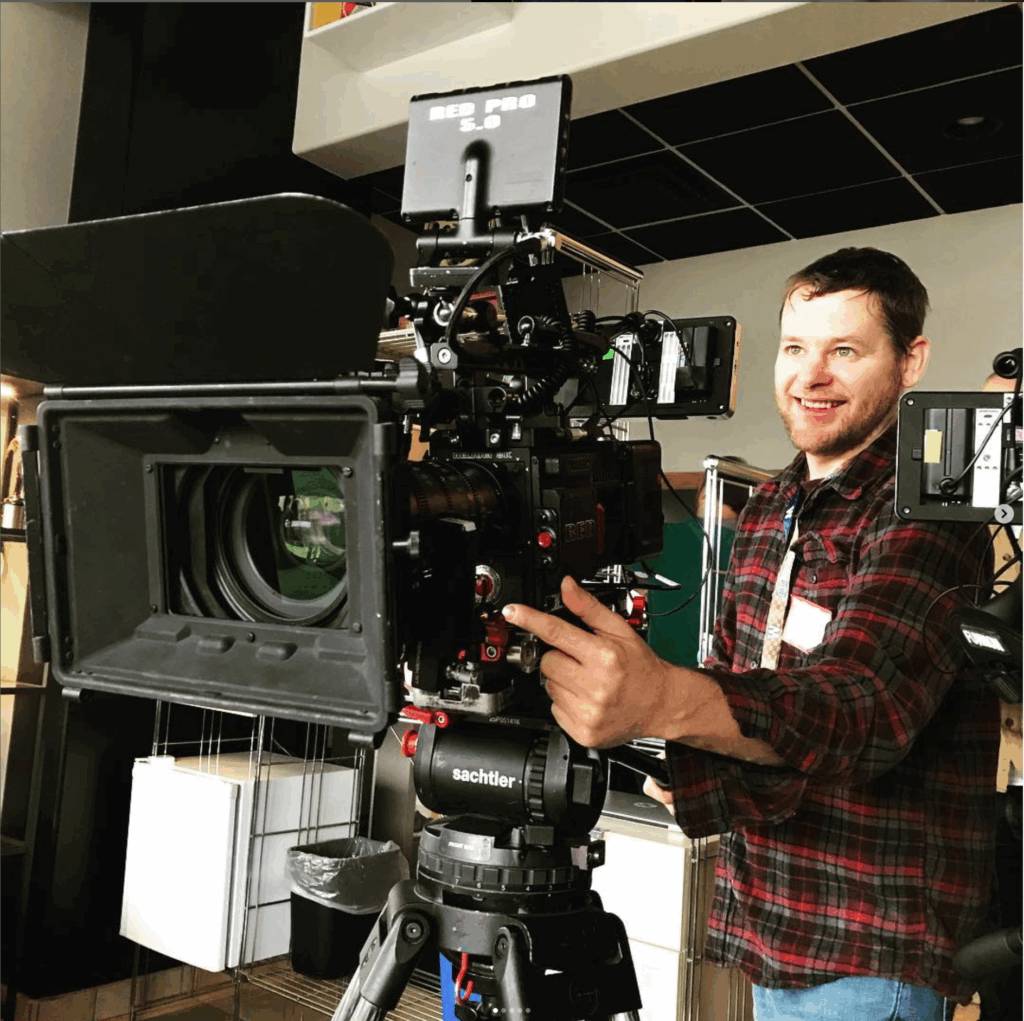
Simon began in the fast-paced UK and European broadcast industry and has worked in production since 2003. From live TV control rooms worldwide to filmmaking in Manitoba, his journey blends technical skill and creativity. Now based in Winnipeg, he runs TALO Films, leading projects as a Director, DP, Editor, Colorist, and Motion Graphics Artist.
Simon brings a hands-on approach to every production, from concept to delivery, and thrives on collaborating with clients who value meaningful, visually impactful storytelling. With a growing roster of social cause–driven content, he continues to expand TALO Films’ reach and refine his craft across platforms.
When and how did you start in the media production industry?
It began in 2003, rigging run-out TV cameras for Sky Sports in the UK. A role that actually influenced the rules of cricket and earned a mention in umpire Dickie Bird’s autobiography.
I moved into live television, working on large-scale live broadcasts around the world, most recently as a Technical Director. I loved the teamwork and high pressure of live broadcasts.
After moving to Winnipeg, I diversified into cinematography, motion graphics, and color grading. In 2016, I launched TALO Films, collaborating with clients like Walmart, NBC, Global, CTV, and APTN. Each project required a tailored approach, combining creativity with technical expertise to tell compelling stories.
What area of the film industry do you work in now and why?
I currently operate TALO Films, a full-service production company based in Winnipeg offering flexible solutions for shoots of any size. I take on many roles myself or work with trusted freelancers from my network.
I specialize in post-production, particularly broadcast delivery and color grading, a niche that fits my broadcast background and creative evolution. It has allowed me to manage complex workflows and deliver content for major broadcasters and brands.
A few years ago, I took a full-time position, and I’m grateful for the stability and opportunity. TALO Films took a bit of a backseat, but I maintained strong relationships with freelance collaborators and continued taking on select projects. I’m in the process of rebooting TALO Films, with fresh reels and social content coming soon.
Some people thrive on large film sets, others focus on roles like DOP or editor. I’ve carved out my space by being adaptable and client-focused. This industry isn’t one-size-fits-all; that’s part of what makes it exciting and challenging.
Balance is essential. Film can be all-consuming without intention, but with passion, adaptability, and clear boundaries between work, home and self, it becomes a rewarding path—often leading to unexpected and inspiring places.
My latest self-produced documentary explores mental health and healing—shot in the Amazon and Galapagos. My first documentary was an underdog story about resilience. This is where I feel most aligned: personal, emotional work with impact. I’m also a certified drone pilot and cinematographer, adding versatility and value to both commercial and documentary projects.
What has been a substantial change in the industry since you started?
Technology has become way more accessible. Some argue it’s taken jobs away—but its also empowering. Anyone can shoot a film with a phone, but it still takes vision, skill and drive to make something great. Creativity and experience still matter.
When I started out, being a camera operator was specialized, rooted in traditional broadcast methods. Then came the DSLR revolution – suddenly, creators were achieving beautiful cinematic looks with minimal gear. It gave us old-school broadcast folks a run for our money.
It took a while, but eventually I embraced the shift.
AI tools like ChatGPT have helped streamline menial tasks, freeing up time for the creative work I love most.
If you could give yourself advice today to yourself in the past, what would it be?
Don’t listen to naysayers—especially the ones in your own head. Figure out where you want to be, and aim for that. I’ve made mistakes, lost focus, and gotten distracted but that’s okay— what matters is believing in yourself. I didn’t always do that, I sometimes still don’t, and that’s okay too. It’s a process.
I’d also remind myself to be more compassionate. I was hard on myself, impatient with the journey, and sometimes overpromised. But setbacks don’t define us. If you stay true to your vision, trust your instincts, and work with humility, you’ll get where you need to go.
What advice would you give to someone starting off in the media production industry?
Figure out what excites you and commit. Pivoting is okay, but do it with purpose—too many changes can cost you momentum. Know your long-term goals, be flexible, and follow through.
Why is learning and training important?
Training builds skills, yes—but also community. Programs like FTM are invaluable for that. I’ve sometimes worked alone, and while it gave me independence, I missed out on shared experiences and support systems. A digital cinema course I took with FTM helped me land DIT work and build a strong technical foundation—skills I’ve since passed on to others. The gear matters, but so do the people.
What are some of the films, TV series or even books that have inspired you? How about anything new you’ve been into?
I’m drawn to stories about resilience, self-discovery, and the search for meaning. Into the Wild and The Pursuit of Happyness are great examples – narratives that resonate deeply with where I’m at in my life and creative work.
The transformation of Walter White in Breaking Bad is a masterclass in character complexity, it lingers with you, challenging how you think about identity, choice, and consequence.
Shantaram stands out as a really impactful book. I landed in Manitoba through my own travel and love story, and the themes of redemption, identity, love, and survival really resonate. I’m drawn to how it navigates the complexities of morality and community in a chaotic world—something that mirrors my own search for meaning through hardship and self-discovery.
My Octopus Teacher was beautiful in its intimate capture between a filmmaker and nature. I’m a diving fanatic and have recently added underwater cinematography to my skill set. This film was a beautiful reminder of the power of stillness and connection, again tying into my latest project.
Is there something about you or an interesting past experience that you’d like to share with your colleagues?
I’ve worked on high-pressure live broadcasts, taught at respected institutions like Ravensbourne in the UK, and built my own production company. My background is a bit different from the scene here in Winnipeg, but that’s a strength. I’m passionate about sharing what I’ve learned and contributing to the creative energy here.
Teaching and mentoring have always been close to my heart. I still seek out those opportunities whenever I can.
Is there someone within the film industry you would like to work with and why?
I was a freelance studio technician at Tower Bridge Studios when Charlie Brooker was recording Newswipe there. I thought it was awesome—really sharp and insightful. He’s since gone on to create Black Mirror, a show I really admire for its dystopian depth and creativity. It’ll probably never happen, but it’d be incredible to work on something like that.
Where do you see yourself in ten years from now?
I’m not sure exactly where I’ll be, and I’m okay with that. What I do know is I want to keep making meaningful work: films, documentaries, and video projects that matter. I’ve been surrounding myself with like-minded producers and collaborators, and I hope to continue building that network into something sustainable and creatively fulfilling. Success, for me, is about doing work I believe in with people I respect. I’m still figuring out the rest.
FTM is a non-for-profit charity and member of the Province of Manitoba’s Sector Council program funded through the Economic Development, Investment, Trade and Natural Resources. FTM builds a highly skilled and adaptable film industry workforce to support the activities of Manitoba production companies. FTM collaborates and partners with members of the film industry to identify training needs to support workforce development.
